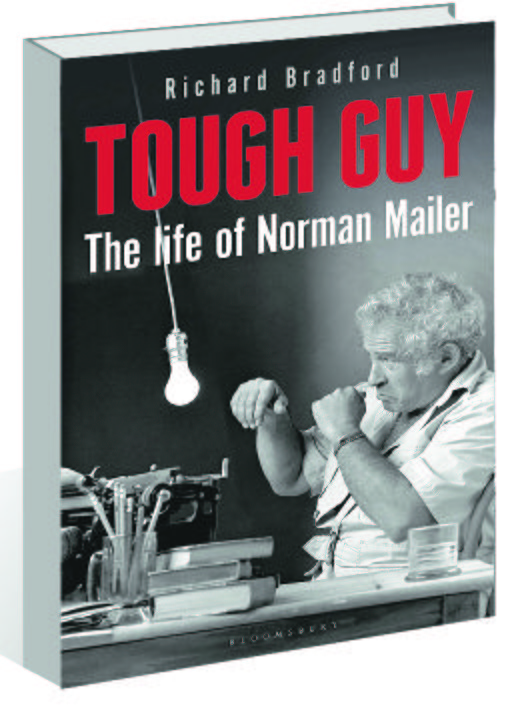Tough Guy: The Life of Norman Mailer by Richard Bradford. Bloomsbury. Pages 304. Rs 1,199
Book Title: Tough Guy: The Life of Norman Mailer
Author: Richard Bradford
Rajesh Sharma
He disapproved of style as an extension of identity, believed that a writer has to learn to climb out of his ego, contemplated death with cool courage, and wondered if human beings exist on more than one level of reality. ‘Part of the crisis of the twentieth century is that nothing like a coherent view of personality seems able to exist,’ he wrote, and treated the opportunity as an invitation to experiment with limits of identity by wearing different masks over what he suspected was an absent face. This ‘intellectual performer of staggering proportions’, to quote Phillip Sipiora, came to be acknowledged as ‘arguably the foremost public intellectual of the second half of the twentieth century’. Every time he wrote, spoke, philandered, married, got into a fistfight with a co-panelist, head-butted another writer, or walked with protesters, he courted misunderstanding. ‘Please do not understand me too quickly’ — André Gide’s words were his favourite quote.
How to pin him down? Richard Bradford’s ‘Tough Guy: The Life of Norman Mailer’ is the fourth attempt at this in the form of a biography. Bradford, who has authored the biographies of Philip Larkin, Kingsley Amis and George Orwell, is after a rather elusive fish this time. He is an engaging storyteller, but fails to penetrate Mailer’s Nietzschean opaqueness. A man of conservative sensibility, he looks for what is not there — a coherent, normative self. Frustrated, he sits down nursing resentment against his subject, which flares into antagonism at times. He would judge, not try to understand, foregoing empathy, a biographer’s finest virtue. Alex Duchev, Joseph Frank, Ernst Pawel, Henri Troyat, Stefan Zweig spun such memorable biographies because they had empathy and insight.
Insight into a writer’s life comes from a study of his work, not from mere acquaintance with it. Bradford is content with tracking Mailer’s career as a series of misadventures and scandals. He has no patience for the motives behind Mailer’s shock tactics. He ridicules him for ‘irresponsibly’ mixing reality and fiction. But Mailer’s is ‘a cumulative reality’, ‘the mysterious reality of what can happen on a page’. Under Mailer’s pen, New Journalism is not a sinful liaison between literature and reporting but an alchemical jugaad to see better and reveal more.
Norman Mailer (1923-2007) had many lives, most of them lived simultaneously. He was a novelist, an essayist, a playwright, a poet, an actor, a journalist, a soldier, a social and cultural commentator, a biographer, an anti-war activist, a postmodern indy theorist, a media star. And he was one of the wealthiest writers of his time. He married six women, fathered seven children, and authored more than 30 books over six decades. Understandably, he inspired bewilderment, awe, and a bit of envy. He often gave himself to alcohol, drugs and sex; but when he wanted to abstain, he did. Nothing could cloud his mind when he sat down to write. And he did sit down with an ascetic’s self-discipline, always cherishing his friend Jean Malaquais’s words: ‘The only time I know the truth is when it reveals itself at the point of my pen.’ Writing was not an escape, nor a game of deceit for him; it was an act of faith and a pursuit of truth. He loathed superficially attractive writing.
Bradford is cynical but not uncritical. He sceptically, sometimes ironically, frames the information that has to go into the book yet cannot be taken on faith. He is fittingly harsh on some earlier biographers and academic critics, laughing at ‘highbrow idiocy’ and smiling over Harold Bloom’s misplaced adoration for ‘Ancient Evenings’, a fantastical miscreation in his opinion. He has a sharp eye for Mailer’s prognosis of the mass media and for his hipster radicalism that lies outside the Marxist pale. But he fails to notice the hip-tributary that flows into the larger stream of what came to be called cultural theory. He also does not quite appreciate Mailer’s prescient insights into media society and hyper-capitalism. And he misreads, by a wide margin, Adorno’s plangent cry of despair over poetry after Auschwitz. Had he a little empathy, he would have closely decoded Mailer’s putative crimes of racist and misogynist stereotyping and seen them for what they were — subtle and intricate subversions of the stereotyping machinery.
Mailer knew he could be misunderstood by most readers, yet he put everything at stake. He had cultivated fearlessness and wanted everyone to shed all fear. He knew that his hero, Hemingway, was not naturally courageous. He idolised him but did not worship him. Henry Miller was far greater in his eyes.
Perhaps Mailer’s best biography was written by himself, as a short essay on Miller, under the title ‘Genius’. But this is just one instance of postmodernism redeeming itself in Mailer: not by abandoning reality but by refining the search for truth.














